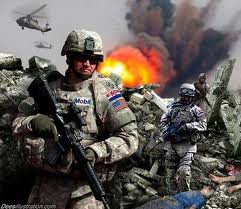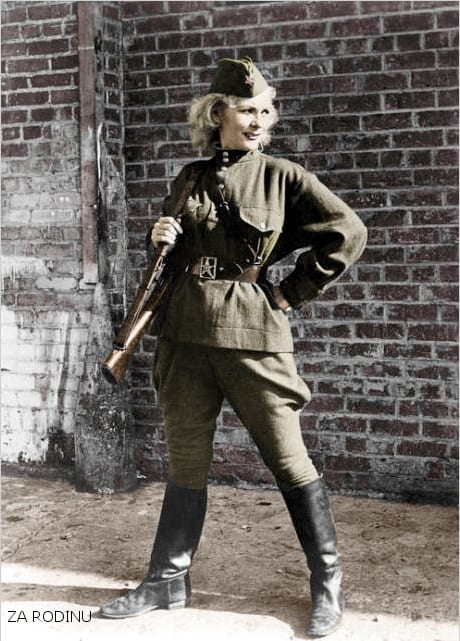Will China Save Us From Hollywood?
Qingdao vs. Hollywood: Rising Chinese Influence on American Entertainment
Hollywood Has Always Been Political
Attempts to say that the products of the film studios located in southern California are “art for art’s sake” and have no political agenda are highly disingenuous. Hollywood’s politics have often been very blatant, so blatant that the US government has stepped in either to utilize or control them.
The first full length movie ever produced was D.W. Griffiths “The Birth of a Nation,” released in 1915. The film contained lengthy quotations from the writings of the sitting President, Woodrow Wilson, and was screened at the White House. The film was a blatant work of political propaganda, designed to strengthen the Democratic Party.
The film retold the history of the American Civil War, portraying Lincoln as a cruel tyrant and the Ku Klux Klan as heroes. The film lauded the defeat of attempts at creating social equality in the post war period, and the establishment of Jim Crow. The title is derived from the belief that the unity of southern and northern whites against African-Americans constituted “The Birth of a Nation.”

The film was shown across the USA, and in Boston and Philadelphia, the audiences were so inflamed with hate, that they left the theaters to go attack African-Americans. Not only did the film inspire race riots, but shortly after its release, the previously illegal Ku Klux Klan was revived as a mass white supremacist movement.
[dropcap]I[/dropcap]n the late 1930s, Hollywood swung to the left. As President Franklin Delano Roosevelt faced a wave of opposition from big business, bankers, and industrialists; the artists, actors, and film directors of Hollywood saw him as their friend and ally. Movies like “It’s a Wonderful Life” and “Mr. Smith Goes to Washington” portrayed capitalists as selfish villains ruining the lives of the common people. Meanwhile, films like Humphrey Bogart’s “The Black Legion” portrayed far-right politics as a destructive scam. Charlie Chaplin ended his anti-fascist comedy film, “The Great Dictator” (see below) with a four minute anti-capitalist speech saying “Soldiers, don’t give yourself to brutes! … Machine men, with machine minds and machine hearts!… Let us fight for a new world…Let us do away with national barriers, let us do away with greed… In the name of democracy, let us all unite!”
When the Second World War broke out, Hollywood films crossed into blatantly pro-Communist territory. The 1942 film “The North Star” portrayed Ukrainian guerrillas fighting off Nazi invaders while singing the praises of socialism in the USSR. The film “Mission to Moscow” portrayed the Moscow Trials of 1937 in a positive light, presenting Stalin as heroically exposing a domestic conspiracy of Japanese Imperialists and German Nazis, in league with Russian Trotskyites. The film “Gung Ho” portrayed a group of US marines utilizing the military tactics of Mao Zedong’s Eighth Route Army.
[dropcap]A[/dropcap]fter the war, in the late 1940s and early 50s, Hollywood faced a huge crackdown on its hard left elements. The House Un-American Activities Committee investigated people working in entertainment who held pro-Soviet and anti-capitalist sentiments. Ten screenwriters who had associated with the Communist Party famously went to prison for refusing to testify against their co-workers. Charlie Chaplin fled the country. Pete Seeger was banned from performing his folk music on national television for over a decade.
Since the 1950s, Hollywood has largely strayed from anti-capitalist or Marxist themes, though it has never been a bastion of social conservatism. Almost since its inception Hollywood has been pushing back the standards of “decency” by including explicit sex, drug use, homosexuality, sacrilege, and other things that both offend people in middle America, and also sell lots of tickets. Hollywood encompasses both ends of the American political spectrum. American cinema generally worships the right-wing capitalist ideal of wealth and profits, while promoting a more liberal cultural hedonism that opposes tradition and community obligation.
A few of the Oscar winning films of recent years have been quite political. The 2012 Academy Award Winning Film “Argo” (directed by a typical H-wood liberaloid, Ben Affleck), portrayed the Iran’s 1979 Islamic Revolution as cruel mob of fanatics, persecuting the well intentioned Americans. The 2008 “Best Picture” winner was a film called “Slumdog Millionaire”, which portrayed the people of India as uncultured primitive barbarians, whose only hope for salvation was the investment of western corporations. In one scene, an American tourist actually hands the young protagonist some cash saying “This is what the real America is all about.”![]()
A “Red Dawn” at the Box Office

The brave American guerrillas fight North Koreans in this utterly imbecilic remake of the original, also from MGM, which was stupid enough in concept and execution.
[dropcap]W[/dropcap]hen preparing to release the 2012 film “Red Dawn”, the Hollywood producers at MGM realized they had a problem. The action movie depicted the United States being taken over by an army of Chinese invaders who commit horrific atrocities. Such a film would undoubtedly be quite offensive to Chinese audiences. At the last minute, the film was digitally edited, so that invaders were no longer Chinese, but rather soldiers from the Democratic People’s Republic of Korea. (sic)
Why did MGM change the film? The Chinese box office is very important. In 2018, it is predicted that movie ticket sales in China will surpass those of the United States for the first time. Furthermore, with theaters rapidly opening across China’s countryside, giving its population of more than a billion people access to the big screen, it is predicted that the already high cinema revenue will double by 2023.
Recent articles in the US press have highlighted the huge amount of influence that the Chinese market, and by default, the Chinese Communist Party has on global entertainment. The AMC Movie Theater chain is owned by the China based Dalian Wanda Group. Dalian Wanda Group, like many supposedly private corporations in China, does not function according to the laws of the market. Just like Huwai, the largest telecommunications manufacturer in the world, or the various “groups” that make up the Chinese steel industry, Dalian Wanda Group is completely subservient to the government.

The original version (1984) had the Russkies as the villains. The whole premise is utterly ludicrous as the US, save for a devastating nuclear attack that would turn both Russia and America into radioactive burial grounds, would have no people or environment capable of sustaining an invasion, let alone occupation and resistance. But nothing is impossible to the feverish anti-communist mind when driven by dollar signs.
[dropcap]T[/dropcap]he CEO of Dalian Wanda Group is Wang Jianlin, the richest man in China. Wang Jianlin may be very wealthy, but he is also a member of the Communist Party. Wang’s father was a hero in the Chinese revolution who marched alongside Mao on the legendary long march. Wang spent 16 years in the military before going into business, and his market activities, which have attracted lots of foreign investment, have always been completely in accordance with the State Development Plans. The Wall Street Journal quoted a former executive of AMC Theaters, Gerry Lopez, complaining about how the directives of Wang, a loyal Chinese Communist Party member, had priority over everything else: “He’s total control. Every decision period, gets made by one guy.”
The products of China’s blossoming domestic film industry are certainly different than those put out by American studios. Chinese films, especially in recent years, tend to promote a sense of duty to the homeland. A large percentage of Chinese films and TV programs promote heroes from the country’s history such as Zhou Enlai or Lei Feng.
An NPR article on Chinese influence on global media gives the impression that Chinese media is almost totalitarian. It complains about how Chinese government officials insist that films not contain “offensive” content, and that their overall message be consistent with the Communist Party’s goals for society.
While this certainly sounds upsetting to adherents of western liberalism, it is more consistent with society’s view of artists throughout most of human history. In most civilizations that have existed over the past 4,000 years, artists were considered to be public servants, who had a duty to improve people with their art. Throughout the vibrant history of human civilization, painters, writers, and performers were not expected to dumb down their art, and make it appeal to the most crass and primitive instincts within people in order to maximize revenue for production companies. Rather than lowering their standards to broaden their appeal, artists were expected to educate, inform, persuade, and challenge their audiences. Art served the purpose of making all of society better, not simply making profits.
Chinese cinema is a business, but it fits its profit-making activities into the overall goals of the Communist Party for a prosperous [and healthy] society. In 2014, China’s President Xi Jinping condemned artists who “are salacious, indulge in kitsch, are of low taste and have gradually turned their work into cash cows, or into ecstasy pills for sensual stimulation.” The Chinese government urges film and TV producers to make art that promotes “socialist core values, as well as patriotism and Chinese fine traditions.” Chinese companies are forbidden from working with films that “harm national dignity and the interest of China, cause social instability, or hurt the national feeling.”
According to the Wall Street Journal, American producers are already limiting the amount of films that contain certain themes like “homosexuality and the undead” because Chinese audiences disfavor them. Furthermore, Hollywood is working hard to include more Chinese actors in supporting roles to appease the desire of Chinese audiences.
Qingdao: “Popularity Should Not Necessitate Vulgarity”

In American mythology W. Wilson is always presented as a peaceloving idealist, the man who gave us the Treaty of Versailles, ending WWI, and later sponsored the League of Nations. His actions, however, fell into the usual pattern of US presidents: interventionist, racist, imperialist, and anti-communist. In his 1915 State of the Union, Wilson asked Congress for what became the Espionage Act of 1917 and the Sedition Act of 1918, suppressing anti-draft activists. The crackdown was intensified by his Attorney General A. Mitchell Palmer to include expulsion of non-citizen radicals during the First Red Scare of 1919–1920.
[dropcap]W[/dropcap]oodrow Wilson, the American President who worked with D.W. Griffith to create the racist propaganda film “The Birth of a Nation” in 1915, was widely hated, far beyond American shores. In 1919, he was hated across the Chinese mainland, most especially in the streets of a city called Qingdao.
Qingdao is part of the Chinese mainland that was forcibly seized by the German empire in 1897. The Germans used Qingdao to host a naval base. While building it, the Germans deported thousands of Chinese people from their homes in order to erect railroads and munitions factories. After Germany was defeated in the first world war, US President Woodrow Wilson, refused to allow Qingdao to be returned to China at the Paris Peace Conference.
In response, Chinese students revolted across the country, burning Wilson in effigy and boycotting American and Japanese products. The May Fourth Movement, a huge explosion of anti-imperialism in response to Wilson’s humiliation of the Chinese people, is often considered to be the opening battle of the Chinese revolution.
Among the young street fighters who forced a boycott on foreign goods and denounced the Versailles treaty was an organization called the “New People’s Study Society” led by a man named Mao Zedong. Eventually the New People’s Study Society abandoned the Anarchist teachings of Peter Kropotkin and helped to form the Chinese Communist Party. Qingdao was finally returned to China in 1922, after decades of foreign occupation. It was seized by the Red Army in 1949, just weeks before the People’s Republic of China was declared in Beijing.
While Qingdao has played a huge role in the armed battles between western capitalism and China’s drive for independence, today it is at the center of a cultural and intellectual battle.
Today, Qingdao is the home of the “Oriental Movie Metropolis.” Already there are 30 sound stages that have been constructed. The world’s largest studio pavilion, set to be over 10,000 square meters, is currently being constructed there. The area will also be home to a research center on IMAX theater technology, and a museum on the history of cinematography. The site is set to become fully operational in 2018.
China’s planned economy, which has already overtaken the rest of the world in telecommunications and steel manufacturing, now moves ahead in the cultural arena. The many thousands of Chinese people involved in film production are guided in their work by the recent words of President Xi Jinping.
In discussing the role of art, he said: “Popularity should not necessitate vulgarity and hope should not entail covetousness… Pure sensual entertainment does not equate to spiritual elation…. The true value of a masterpiece lies in its intellectual depth, artistic exquisiteness and skillful production.”
 Is an American journalist and political analyst. Tasnim News Agency described him as "a native of Ohio who has campaigned against war and the U.S. financial system." His political activism began while attending Baldwin-Wallace College in Ohio. In 2010, he video recorded a confrontation between Collinwood High School students who walked out to protest teacher layoffs and the police. His video footage resulted in one of the students being acquitted in juvenile court. He was a figure within the Occupy Wall Street protests in New York City. Maupin writes on American foreign policy and other social issues. Maupin is featured as a Distinguished Collaborator with The Greanville Post. READ MORE ABOUT CALEB MAUPIN HERE.
Is an American journalist and political analyst. Tasnim News Agency described him as "a native of Ohio who has campaigned against war and the U.S. financial system." His political activism began while attending Baldwin-Wallace College in Ohio. In 2010, he video recorded a confrontation between Collinwood High School students who walked out to protest teacher layoffs and the police. His video footage resulted in one of the students being acquitted in juvenile court. He was a figure within the Occupy Wall Street protests in New York City. Maupin writes on American foreign policy and other social issues. Maupin is featured as a Distinguished Collaborator with The Greanville Post. READ MORE ABOUT CALEB MAUPIN HERE.
Note to Commenters
Due to severe hacking attacks in the recent past that brought our site down for up to 11 days with considerable loss of circulation, we exercise extreme caution in the comments we publish, as the comment box has been one of the main arteries to inject malicious code. Because of that comments may not appear immediately, but rest assured that if you are a legitimate commenter your opinion will be published within 24 hours. If your comment fails to appear, and you wish to reach us directly, send us a mail at: editor@greanvillepost.com
We apologize for this inconvenience.
Nauseated by the
vile corporate media?
Had enough of their lies, escapism,
omissions and relentless manipulation?
Send a donation to
The Greanville Post–or
But be sure to support YOUR media.
If you don’t, who will?
![]()
=SUBSCRIBE TODAY! NOTHING TO LOSE, EVERYTHING TO GAIN.=
free • safe • invaluable
[email-subscribers namefield=”YES” desc=”” group=”Public”]


















